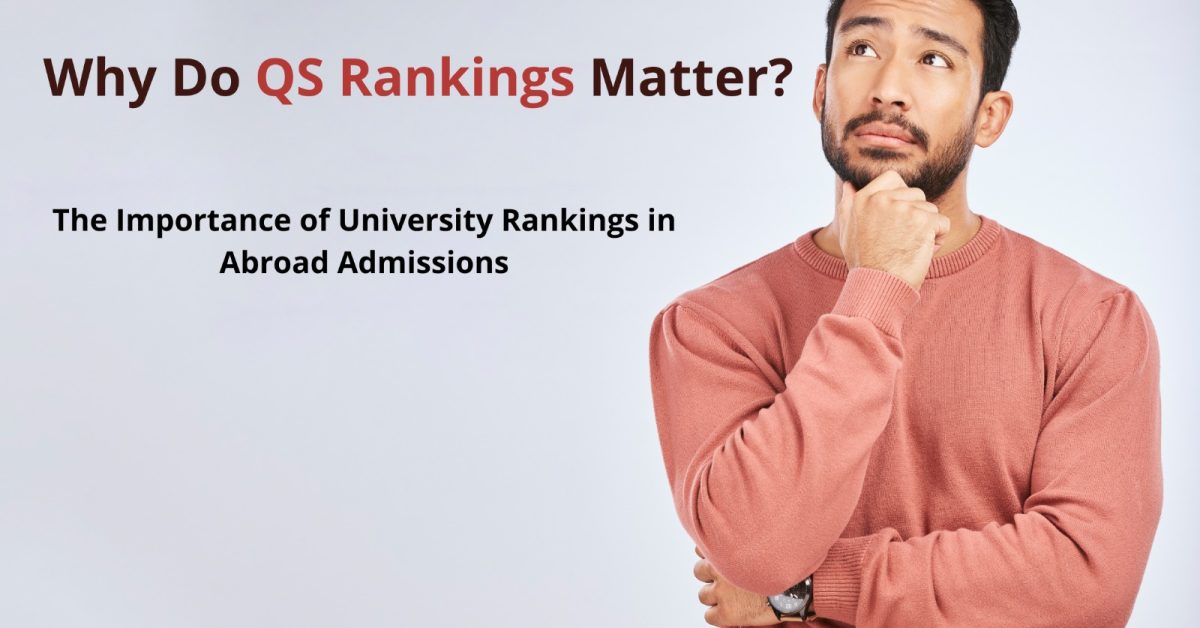Are you a student looking for a university to study abroad in? Are you wondering which university to pick? Too many options to choose from and don’t know how to make the best choice?
Every student is faced with a dilemma of how to choose a good university, which specialty to choose in their preferred subject/field, how easy it is to find a job after graduation, how to choose between the UK or Australia as their study destination, or how do universities support international students?
What are QS World Rankings?
Quacquarelli Symonds rankings, also known as QS rankings will make these decisions easier for you. They are one of the most prestigious international rankings that assess the popularity and performance of institutions worldwide. They have published a list of top universities every year since 2004 and are considered to be the most popular amongst the top three ranking systems: QS Rankings, Shanghai Rankings, and The Times Higher Education (THE) World University Rankings.
The QS system is split into mainly three parts: a global overall ranking, subject rankings that identify the best universities in the world for 51 different subjects and five composite faculty areas, and five independent regional tables, namely Asia, Latin America, Emerging Europe and Central Asia, the Arab Region, and BRICS.
Factors Considered In QS World Rankings:
QS University Rankings are a set of criteria that organizations use to measure how universities perform. In 2024, these factors include:
| Performance Criteria | 2024 Edition Weightage |
| Academic Reputation | 30% |
| Citations Per Faculty | 20% |
| Employer Reputation | 15% |
| Faculty/Student Ratio | 10% |
| International Faculty Ratio | 5% |
| International Student Ratio | 5% |
| International Research Network | 5% |
| Employment Outcomes | 5% |
| Sustainability | 5% |
-
Academic Reputation:
Academic reputation is related to academic excellence and the scholarly esteem in which the world’s universities are held. It collates more than 150,000 responses from academics in more than 140 countries and locations. Combined with the Employer Reputation Index it is one of the most key factors which sets this ranking most clearly apart from any other. It seeks to answer the powerful question: Which universities are showcasing academic excellence?
-
Citations Per Faculty:
Research output is as important as teaching quality to establish university credentials. University research quality is measured using the Citations per Faculty metric, taking into account the size of the institution. It includes taking the total number of citations received by all research papers published by a university across five years by the number of faculty members at that institution. Citations are a well-accepted and widely popular measure of research strength. QS attempts to measure the density of research-active staff at each institution.
-
Employer Reputation:
Employer Reputation is a unique factor amongst current international evaluations in taking into consideration the important component of employability. It is a famously problematic factor to measure. The reputation of the university amongst employers is of critical importance since the majority of undergrad students leave the university in search of employment after their first degree. Employment reputation looks at how effective a university is at preparing the student for the employment market. It asks employees a critical question: Which institutions do they source their most effective, skilled, and innovative graduates from?
-
Faculty/Student Ratio:
For any student, the standard of teaching quality is one of the most important criteria when picking a university. The factor/student ratio is a measure of staff resources provided to students, which includes the teaching capacity, size of the class, curriculum development, lab and seminar delivery, pastoral care, teaching capacity, and class size. It is difficult to quantify and measure teaching quality. Hence, QS Rankings provide an alternative to measuring teaching quality by outlining the Faculty/Student Ratio.
-
International Faculty Ratio:
If a university is attracting a substantial population of international faculty then this benefits students in terms of the research and teaching diversity and collaboration. Also, if a university is attracting a sizable number of overseas staff it follows that it is lucrative and credible enough to do so. It evaluates the ratio of international faculty staff to overall staff. It shows whether a university is putting effort into global collaboration and diversity, but also because it indicates global appeal for researchers around the world.
-
International Student Ratio:
If a university is attracting a sizable population of international students this has benefits in terms of networking, cultural exchanges, a more diverse learning experience, and alumni diversity.
-
International Research Network:
The International Research Network is a reflection of global engagement, specifically on how universities create, maintain, and repeat research partnerships resulting in internationally co-authored publications with other universities across borders to collaborate on solving the world’s challenges and disseminate important research to wider audiences.
-
Employment Outcomes:
A successful career is the primary goal of any student planning to pursue an education in any international university. Employment outcomes are a reflection of any university’s ability to ensure a high level of employability for its students. QS Graduate Employability Rankings combine the following factors:
- Graduate Employment Index
- Alumni Impact
The Alumni Impact Index is balanced against student numbers to ensure that larger and smaller institutions are equitably evaluated.
-
Sustainability:
Sustainability is a new metric for calculating QS rankings, introduced in 2024, to help emphasize the importance of this topic to students, institutions, national policymakers, and the wider sector. It is a reflection of a university’s ability to showcase a sustainable existence. The rankings are based on all the data collected through surveys and external sources such as the World Bank and the UN to provide a resource for students, academics, and policymakers to assess universities’ sustainability performance and identify best practices for achieving sustainability goals.
Why Do QS Rankings Matter To Students?
Rankings are a great place to start when you’re doing your initial research on where to study. They can help you figure out which universities offer a good student experience, and which universities have better employment outcomes. Mentioned below are reasons as to How and why are QS rankings used consistently as a reliable indicator for students when deciding on an international university.
-
Early-stage Shortlisting Tool:
QS Rankings are most commonly used to shortlist ideal destinations to study. It acts as a first stepping stone for any queries and research into universities in the future. If a student already has a study destination in mind, then university rankings can help in narrowing down the list further, making it easier to pick the right university.
-
Quick Reputation Checker:
Students looking to study abroad often look at QS World Rankings to gauge the reputation and global standing of the universities. These rankings can also add focus on universities that may have yet to be previously known to prospective students and also can help students get disillusioned about their desired university.
-
Direct Comparison Tool:
Few students also use QS rankings for direct comparison between two or more universities. But this only helps in cases where there is a significant difference between the rankings of the universities.
-
Key Indicators of Future Employment Opportunities:
Almost all students expect a good ROI from the funds invested in getting their first degree. QS rankings can also be used to ensure that a student’s chosen university will be recognized by employers in the future. Choosing a highly-ranked university can provide students with valuable networking opportunities with other students, alumni, and industry professionals who are leaders in their fields. This can be beneficial when looking for internships, job placements, or even business ventures.
Drawbacks of QS Rankings:
While university rankings can be helpful in a more general sense, they’re based on a set of criteria that may or may not serve a student’s individual needs. QS rankings don’t cover crucial factors like affordability and campus culture. This means one should consider other personally relevant factors, like the subject you’ll be studying, one’s personal preferences, and the institution’s cultural fit. Let’s dive deeper into these factors below:
-
Subject-based Rankings:
QS rankings provide a more holistic view of universities that does not help gauge the quality of a student’s specific subject of interest. So, it is always advisable to look at subject-specific rankings that are better suited to the student’s interests. A university with a high overall ranking might be ranked lower in the area a student wishes to study and vice versa. In such a scenario, another university with a higher program ranking might be the smarter choice, even when the university’s overall ranking is lower.
-
Personal Preferences & Budget:
Any university rankings don’t take into consideration a student’s personal preferences and budget constraints. A university that is a great choice for one student may not be so great for another student. Factors like location, extracurricular activities, scholarships, accessibility to student loans, cost of living, and availability of support services are not considered in university rankings even though they can greatly affect a student’s college experience and their finances.
-
Campus Culture:
Studying abroad should be a holistic experience for any student and that involves a lot more than just academic factors. Campus culture, the university’s social environment, and opportunities for personal growth should be vetted equally before choosing a university. But QS university rankings don’t consider these factors even though they can greatly affect your college experience.
Conclusion:
While Quacquarelli Symonds rankings are a great starting point for evaluating different international universities, they shouldn’t be the only determining factor when choosing where one should study abroad. It’s important to think about other factors that match one’s academic and personal goals, which can make a huge difference in one’s study abroad experience.
It’s also important to remember that it’s not just about where one studies, it’s also about making the most of the opportunities and resources available, regardless of the ranking of a student’s chosen university.
Still unclear about how to decide which international university is best for you? Fret not, we’re here to help. Get in touch with our experts at Mind Mirror who can help with this decision.
Mind Mirror – Career Guidance & Counseling is a pioneer name in the field of career counseling and personal guidance is a team of the Best Career Counselors in India. Mind Mirror is the most- advanced website for online career assessment, career guidance, and career counseling in India, designed for school students and graduates.




